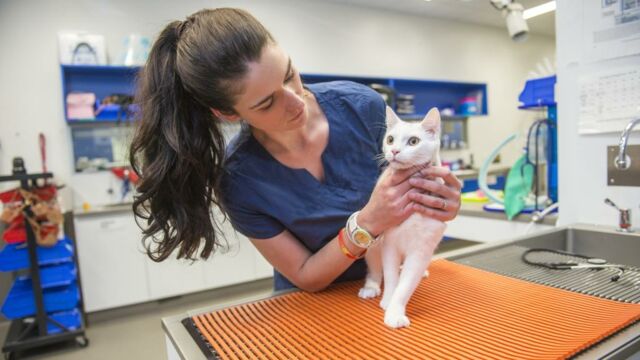Our beloved pets may contract the UK variant of COVID-19. In any case British and French virologists revealed in this new study. The B.1.1.7 strain—the scientific term for the British variant—was reportedly found in dogs and cats at a veterinary clinic in the outskirts of London.
Discover our latest podcast
Three animals tested positive
This veterinary clinic has reportedly noticed an increase in cases of myocarditis, an inflammation of the muscle allowing the heart to contract and pump blood. This unusual increase was noticed in dogs and cats between the months of December 2020 and February 2021.
According to virologist Eric Leroy, of the Research Institute for the Development of the University of Montpellier, the new cases of myocarditis would have increased from 1.4 to 12.8%.
To find out what caused this rise, virologists conducted a study in eight cats and three dogs, aged 1 to 12, who had no prior history of heart disease.
After having carrying out RT-PCR tests (equivalent to the PCR test in humans), showed that the studied pets were now suffering from 'cardiac disorders, arrhythmias and pulmonary edema, syncope (loss of consciousness), and also showing a loss of appetite,' says CNEWS.
These clinical signs are 'unusual in these animals' as the scientists point out in a press release. Indeed, three of the animals tested positive for the British variant in this London clinic.
Faced with this grim news, the Faculty of Veterinary Medicine and Biomedical Sciences at Texas A&M University, USA, has also started giving RT-PCR tests to animals showing symptoms of myocarditis, and, once again, the result are bad: a cat and a dog have tested positive for the British variant.
For the time being, virologists cannot confirm that the British variant of the coronavirus is the cause of the myocarditis detected in these animals. However, this hypothesis remains probable, and it is now time to do more research on the subject.
Is there a link between humans and animals?
Scientists will perform additional studies in order to 'assess the level of contagiousness of the British variant between pets and its transmission to humans,' says the virologists in a statement according to CNEWS.
Indeed, it was known already that cats and dogs could be contaminated by the classic strain of SARS-CoV-2, but causing only some mild clinical signs such as coughing, sneezing, etc.
This news is being taken very seriously, and it should be resolved very soon, because scientists are already thinking about solutions to deal with the complications that possible human-animal transmission can cause. They warn:
Given the increased infectiousness and transmission of the B.1.1.7 variant to humans, the discovery of cats and dogs infected with B.1.1.7 highlights more than ever the risk that pets could potentially play a significant role in the spread dynamics of the SARS-CoV-2 epidemic.
Find more information on pets and COVID-19 in the video at the top of the page.















